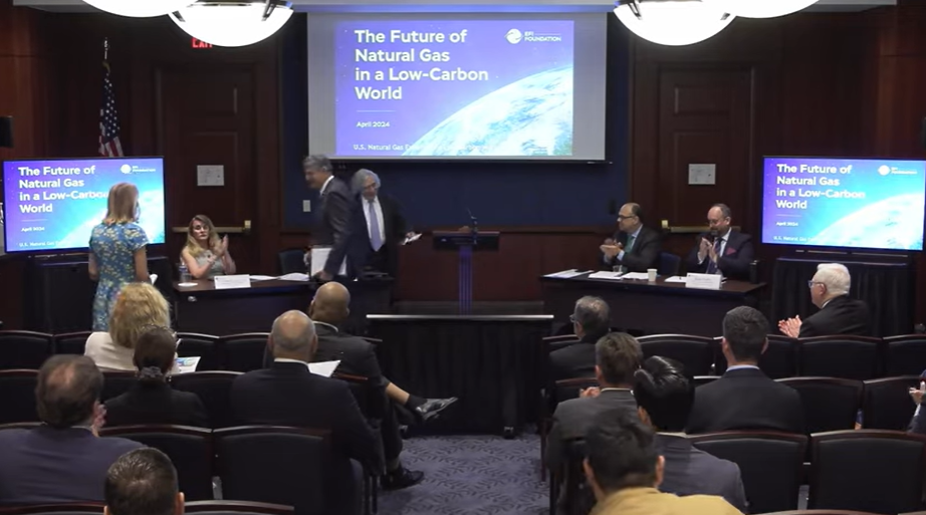
On April 30, 2024, the EFI Foundation (EFIF) hosted an event on Capitol Hill to highlight a new report that features findings from 18 months of research, analysis, and convenings on the future role of natural gas in a low-carbon world.
Natural gas will continue to be a fuel source to aid in the low-carbon energy transition and play a role for energy security worldwide. The EFIF report examines how natural gas has different roles to play in the United States, Europe, and Asia, and how the use of natural gas could vary in the short to medium term depending on the industry’s pace of greenhouse gas emissions reductions. The report also analyzes how natural gas could help address the energy trilemma: energy security, energy equity, and environmental sustainability.
At the event, EFIF CEO Ernest J. Moniz provided introductory remarks and Melanie A. Kenderdine, then-executive vice president of EFIF, gave a presentation on the report. [Ed. note: Kenderdine was recently named New Mexico Secretary of Energy, Minerals and Natural Resources.] The event also featured special remarks from U.S. Senator Joe Manchin (D-WV), U.S. Senator Lisa Murkowski (R-AK), and Maroš Šefčovič, executive vice-president of the European Commission.
Moniz said that natural gas is well-situated to satisfy the competing needs of the energy trilemma.
“Just about everyone, both domestically and internationally, values all three of these objectives, but we should also acknowledge that the priority ordering of those is not the same in different parts of the world,” Moniz said. “Natural gas is, in fact, core to that discussion about balancing all three of those priorities. … Progress on all of them requires treating it as one conversation.”
U.S. Partisanship
As detailed in the report, the United States is the world’s largest exporter of natural gas, meaning it can be a global leader on both energy security and supply chain decarbonization. However, Senator Joe Manchin (D-WV) and Lisa Murkowski (R-AK) said that partisanship in Washington, D.C., has made it more difficult for Democratic and Republican policymakers to discuss legislation that allows the United States to use its natural gas supply to benefit itself and the world.
Manchin said that lawmakers from both parties need to have a clear-eyed view of how U.S. natural gas can play a role in combatting climate change and in providing our allies energy from a trusted trade partner, rather than from an adversary. He said lawmakers need to craft policy with this reality in mind.
“Gas has got to be in play,” he said. “Everything that we replaced by producing in America helps the climate if we can keep dirtier fuels off the market.”
Murkowski explained that conversations around energy are different outside of Washington, D.C. She discussed how the top priority for most consumers is having a mix of energy sources that bring them affordable, reliable power.
“It’s not necessarily a Republican thing to believe that we need more oil and gas or a Democrat thing to believe that we need more renewables,” she said.
European Energy Security
Maroš Šefčovič, executive vice-president of the European Commission, explained that natural gas has an important role to play as a transitional fuel that can help Europe meet its energy security and energy equity goals. He thanked the United States for being an ally to the European Union and supplying more natural gas following Russia’s full-scale invasion of Ukraine—but also said that Europe is still in a precarious position.
“While the situation has now stabilized, we must remain vigilant,” Šefčovič said. “With the U.S. now acting as guarantor of global energy security, thanks to its [liquified natural gas], any decision that may give the market jitters should be carefully considered.”
He discussed the need to continue to strengthen the “strategic energy partnership” between the United States and the European Union and promote job creation and accelerate clean energy development in both regions.
Emissions Reductions
Melanie Kenderdine, then-executive vice president of EFIF, explained how natural gas is helping governments and companies make progress toward their net-zero goals. She said that natural gas, which emits half the carbon dioxide of coal, has already significantly decreased domestic carbon dioxide emissions and cited an International Energy Agency statistic highlighted in the report.
“The U.S. leads the world in emissions reductions, and 61% is from coal-to-gas fuel switching,” Kenderdine said.
She then discussed how switching from coal to natural gas has reduced global carbon dioxide emissions, saving “around 500 million tons [of carbon dioxide], an effect equivalent to putting an extra 200 million [electric vehicles] running on zero-carbon electricity on the road.”
Yet Kenderdine also said that more work must be done to cut carbon dioxide emissions from natural gas and methane leakage. She said that deploying carbon capture and storage technologies at a larger scale could help with carbon dioxide emissions, especially in the industrial sector. She added that using multilateral development banks to invest in projects in developing countries could reduce methane emissions.
The report also highlights how bolstering coordination on the Global Methane Pledge and quantifying methane emissions from natural gas shipping more accurately could help as well.
Special Panelist Remarks
Two panelists prepared special remarks, which were released after the event. They focused on the future role of natural gas in the global energy supply mix.
Anatol Fegyin, executive vice president of Cheniere, focused on the industry perspective in his remarks. He explained that because of pre-existing infrastructure, natural gas can be easily deployed as part of the energy transition.
“Natural gas can provide solutions for harder-to-electrify sectors, lower costs through the ability to scale up the use of existing infrastructure, and the ability to scale up hydrogen” Feygin said. “It sets forth a platform to address the energy trilemma today and both in the near and distant future.”
Ichiro Kutani, senior research director at The Institute of Energy Economics, Japan, discussed the role that natural gas would play in Asia’s economy in the coming decades. He explained that it would be important because of continued population growth and high economic growth in developing countries in the region. He said that since Asia does not have abundant wind or solar resources, this growth would likely otherwise be powered by dirtier fuel sources, such coal or oil.
“Energy demand in Asia will grow, and natural gas will be an indispensable part of the energy supply mix,” Kutani said.
In his remarks about the role of natural gas in the global energy mix, Moniz said that countries and industry leaders must cooperate to meet energy needs while reducing emissions.
“We cannot diminish the role of decarbonization. It is an absolutely critical and long-term commitment,” Moniz said. “We have to work together, especially with allies and friends.”
– Georgia Lyon, Communications Associate
(Share this post with others.)




